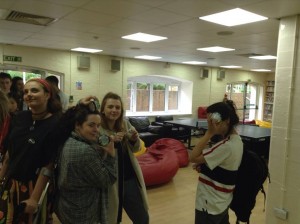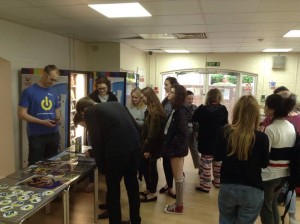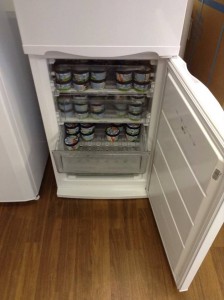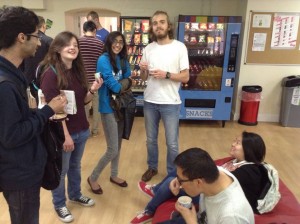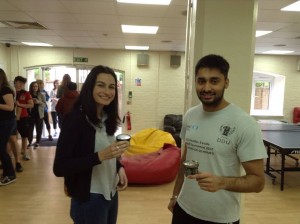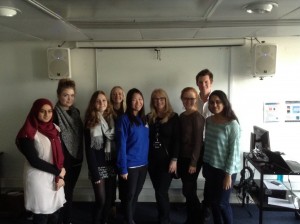[This week’s guest blog comes courtesy of Robert Zlokower, a MSc student in Sustainable Cities. The views presented do not necessarily reflect those of King’s Sustainability]

Humble beginnings
The rainy monsoon season.
This was when the ancient ‘sangha’ – as the Buddhist community was and still is called – would settle down, coming together in huts or shelters to meditate and study together.
We are like them. The rainy season marked a change in the climate. And the settlement is like our campus. But rather than paralyse from fear or deny the climate, the sangha used it as a time to grow together. The same applies to today.
Climate change is the best thing to happen to humanity.
At no other time have we had such a clear knowledge of our potential apocalypse than now. When past speculations may have been based on visions and scriptures, today’s predictions are based on scientific evidence. So we really know what we’re up against.
So too do we know the solution: a society based on sustainable principles and technology. A society based not on war, but on working together for the common good. Technology that we actually already have, but just hasn’t been diffused enough yet. The sun’s increasing UV rays are actually a golden chance for humanity to band together. In order to save ourselves, we must commit to the biggest act of selflessness – that is saving nature.
This obstacle is an opportunity.
The 1968 photo of Earth from space ignited consciousness of humanity as ‘global’ and fuelled environmental movements. For sustainability, action is taken not only on a global scale, but also at national, city, community and citizen-levels. To be completely upfront, I’m only in the humble beginnings of sustainable citizenship. My desire started out of frustration when I went to B&Q home supply a few years ago to get a solar-PV panel for my shed, and the staff replied, “a what panel?” I was working in media at the time, managing a forum for the world’s opinion-leaders to debate sustainability, climate change and dwindling resources. I wanted to put these global problems into practical on-the-ground solutions.
Much of my activity is actually daydreaming. Any D-I-Y I undertake generally results in excessive man hours made up of swearing and broken timber (both accidental and purposeful). And as an impoverished student, I can barely afford a discounted pint at the student union, let alone investment in low-carbon technologies. Still, I’ve been inspired to have a go, so at least that’s a start. Here’s what I’m personally looking into as an aspiring sustainable citizen….
The boat life
I recently moved off-grid onto a narrowboat in the canal. I cruise along the Regents Canal and Lea River.

The rooftop solar-PV array
I had the boat fitted with solar photovoltaic panels to charge my on-board batteries. This in turn powers my lights (mainly LED), water-pump and most appliances. To conserve energy, I try to keep to 12-volt appliances, and I leave my fridge off in the winter (I cool perishables either next to my water tank or on my deck). I periodically take on board drinking water from water points along the canal. I’d like to look into collecting and filtering rainwater from my roof. So with limited electric and water on board, I need to be consciously frugal with my resources. Or use my resources wisely – for example, when I cruise the boat, the engine heats the water tank, so it’s the perfect opportunity to later take a shower and wash the dishes.
My engine, apparently the same as in a London taxi, runs off of diesel. At some point, I’d like to explore an alternative fuel, for example used Cooking Oil. In the meantime, every time I run the generator for a high wattage appliance, I’m reminded by the noise and fumes that I’m sucking up fossil fuels. When you turn on your electric iron, are you aware that a power plant somewhere in the distance is guzzling up in 2 and a half minutes a finite resource that took a 2 and half million years to produce?

And the beautiful rooftop garden
For heat, I have a solid-fuel stove. I collect wood chips for kindling from the rubbish heap of a woodcutter at a local hardware store. And I saw spare wood from a local city farm in exchange for volunteering as a gardener. The volunteer work also garnered me a discount with the locally-sourced vegetable service.
I got a composting toilet fitted, so I don’t need water to flush and I can convert the waste to fertilizer. I also have bokashi bins to compost food waste. Eventually I would like to use these wastes to fertilize the canal towpath or my garden on the rooftop, where I also store my bicycle (Btw, King’s College buildings have showers, which helps after long-distance cycling!). I’d like to explore building a small chicken-coup into the front deck of the boat.
Living the canal life means I’m usually surrounded by nature – marshes, woodland, fields, swans, geese, ducks, fish. It helps me as a city-dweller appreciate planet earth. And without a TV on board, I’m no longer brainwashed from TV commercials to buy useless junk that wouldn’t even fit in my little abode anyway!
I’m interested in applying for a mooring at a sustainable narrowboat community in a basin in East London. In the meantime, due to canal regulations I must change moorings every 2 weeks, which actually pushes me to explore a different neighbourhood every time (perfect for a KCL geography student such as myself!).
My goal with this boat is to get as close as possible to being an off-grid self-sufficient microcosm. I also own a house in East London that I’m renting out, but I eventually would like to convert it into a carbon-neutral bed & breakfast – replete with solar-PV panels and batteries, rainwater collection, composting toilet and composting boxes in an urban garden and whatever else I can do to make it off-grid like the narrowboat. A friend warned me I should watch out that someone might steal my ideas. I say bless the thief! If he can kick-start some sustainability quicker than me, then my hat’s off to him!
I’m inspired by Dick & James Strawbridge’s “Practical Self Sufficiency: The Complete Guide to Sustainable Living.” But to be honest, I really could do with a bit of help! At least it’s an opportunity to make some friends and have fun getting creative.
Sitting here in the boat typing this blog post, the rain pattering my steel rooftop, I’m reminded of the sangha, settling from sweeps of rain splashing their huts. I look out my window; a swan floats along night-time waters. Does the swan think about climate change the same way I do? Does she realise it’s a chance for unselfishness, compassion, camaraderie and fun?
The swan dunks her head into the water.

– Robert Zlokower (robert.zlokower@gmail.com)

